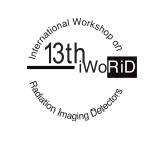Speaker
Dr
Andrea S, Brogna
(Karlsruher Institut für Technologie)
Description
Hybrid Pixel Array Detectors (HPAD) are revolutionizing the field of photon detection at synchrotron storage ring and free-electron laser light sources. Excellent detection quantum efficiency, high throughput and noise performance are major improvements over current detectors based on charge coupled device (CCD) cameras. Examples of HPAD detectors are Pilatus, Medipix and XPAD.
The German-Russian collaboration Galapad developes Medipix pixel detectors for the use in synchrotron applications. The chosen GaAs sensors realize higher efficiency resulting in the need for fast data processing electronics.
We are implementing a flexible data acquisition system utilizing the Virtex-6 FPGA ML605 Evaluation Kit. It allows the communication via the USB bridge, the gigabit Ethernet or the high data rate PCI-Express. The sensitive surface of the multichip system, 3x2 high-Z semiconductor detectors, is read-out serially at a clock speed of 150 MHz with an initial frame rate of 30 frames/s
The prototype comprises the complete data acquisition system to provide a compact camera. It is capable of integrating existing hardware and the software package “Pixelman” and is compatible with the Medipix2 family, including TimePix and Medipix3.
The versatility of this system makes it suitable for a range of applications. The sensors will be tested using a variety of materials (e.g. Si, CdTe and GaAs). The performance of the system will be evaluated with various radiation sources like X-ray tubes and synchrotron radiation.
Author
Dr
Andrea S, Brogna
(Karlsruher Institut für Technologie)
Co-authors
A. Fauler
(Albert-Ludwigs-Universität Freiburg)
Andreas Zwerger
(Albert-Ludwigs-Universität Freiburg)
Elias Hammann
(Karlsruher Institut für Technologie)
Marc Weber
(Karlsruher Institut für Technologie)
Matthias Balzer
(Karlsruher Institut für Technologie)
Michael Fiederle
(Karlsruher Institut für Technologie)
Stefanie Smale
(Karlsruher Institut für Technologie)
T. Baumbach
(Karlsruher Institut für Technologie)
